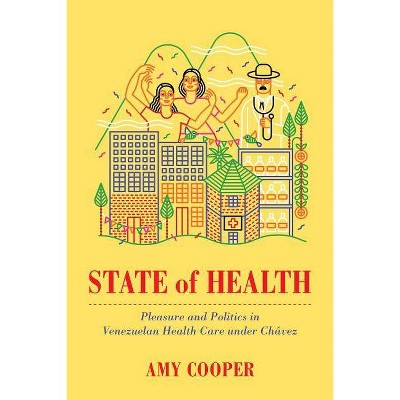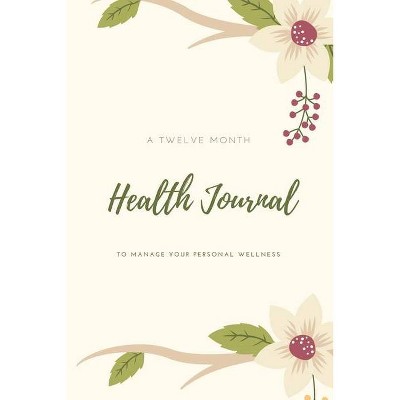State of Health - by Amy Cooper (Hardcover)

Similar Products
Products of same category from the store
AllProduct info
<p/><br></br><p><b> About the Book </b></p></br></br>"State of Health: Pleasure and Politics in Venezuelan Health Care under Châavez takes readers inside one of the most controversial regimes of the 21st century for an in-depth account of how poor people's lives changed when the state reorganized its health system. This lively and accessible ethnography looks at the pleasure people took in new features of government health care such as personalized doctors' visits, health activism, and therapeutic dancing. Based on extensive participant observation and interviews, this book shows that government health care in revolutionary Venezuela excited people because it provided more than medicine. Health programs empowered and affirmed poor people as valued members of society, making it clear that their lives mattered. This book explains the meanings of socialized medicine from the vantage point of historically marginalized Venezuelans, who made up the majority of the country's population. It offers a singularly unique account of daily life in Châavez's Venezuela. Although people's lives have changed dramatically since the Châavez era, this book provides lasting insights into how ordinary people experience radical moments of social and political change. State of Health signals a paradigm shift in the field of medical anthropology by establishing the value of studying pleasure with the same seriousness of purpose with which ethnographers study suffering. This book shows how paying more attention to the positive aspects of medicine could revolutionize our understanding of how health care gives meaning to people's lives"--Provided by publisher.<p/><br></br><p><b> Book Synopsis </b></p></br></br><i>State of Health</i> takes readers inside one of the most controversial regimes of the twenty-first century--Venezuela under Hugo Chávez--for a revealing description of how people's lives changed for the better as the state began reorganizing society. With lively and accessible storytelling, Amy Cooper chronicles the pleasure people experienced accessing government health care and improving their quality of life. From personalized doctor's visits to therapeutic dance classes, new health care programs provided more than medical services. <i>State of Health</i> offers a unique perspective on the significance of the Bolivarian Revolution for ordinary people, demonstrating how the transformed health system succeeded in exciting people and recognizing historically marginalized Venezuelans as bodies who mattered.<p/><br></br><p><b> From the Back Cover </b></p></br></br><i>"State of Health </i>offers a brilliant contribution to the timely question of what constitutes good health care and, in doing so, expands how we understand the power of medicine."--Emily Yates-Doerr, author of <i>The Weight of Obesity: Hunger and Global Health in Postwar Guatemala</i> <p/> "This book brilliantly captures a historical moment in the early years of Venezuela's implementation of Barrio Adentro, a state-sponsored program of social medicine. Cooper deftly theorizes how medicine can serve as a source of pleasure, as a therapeutic tool to redress social and political inequality, and as a technology of social justice to empower disenfranchised communities."--P. Sean Brotherton, author of <i>Revolutionary Medicine: Health and the Body in Post-Soviet Cuba</i> <p/> "A refreshing and ethnographically intimate account of one of the most creative experiments in health care of our time. <i>State of Health</i> itself exudes the pleasure expressed by patients and volunteers when care becomes a key locus for embodying equality and solidarity."--Charles L. Briggs, coauthor of <i>Tell Me Why My Children Died</i><p/><br></br><p><b> Review Quotes </b></p></br></br><br><i>"State of Health </i>is an accessible, eminently teachable book set in Venezuela at the height of the Bolivarian revolution. . . . In contrast to many Latin American medical ethnographies that document the distrust and suffering wrought by state-sponsored medicine, Cooper proposes that 'joy, excitement, and satisfaction were central to people's experiences of Barrio Adentro.' The idea that medical care can be pleasurable is powerful in its simplicity."-- "Medical Anthropology Quarterly"<br><br>"<i>State of Health</i> is a compelling ethnography on the interconnections among health care systems, pleasure, and radical politics during Venezuela's Bolivarian Revolution. . . . Using a well-developed conceptualization of pleasure that encompasses biophysical health, sensual and social pleasure, and sociopolitical empowerment, State of Health offers critical insights into how poor and working-class Venezuelans experienced the Chávez years. . . . <i>State of Health</i> will appeal to a broad readership interested in Latin America, health care, radical politics, and the anthropology of affect and would be an excellent choice for undergraduate and graduate courses."-- "American Ethnologist"<br><br>"<i>State of Health</i> is an engaging and insightful ethnography of health care provision in Venezuela under Chávez. By centering the role of pleasure, it invites us to rethink our frameworks for analyzing medical care. The book is written in a clear and accessible style, and, as such, it can be read at a variety of levels. . . . This book should be required reading for anyone hoping to learn more about social medicine in Latin America."-- "Journal of Latin American and Caribbean Anthropology"<br><br>"Given the current polarized situation in Venezuela, medical anthropologist Amy Cooper provides important and compelling insights into how ordinary people experienced policy changes during Hugo Chávez's progressive government . . . In listening to people's stories, Cooper gained innovative insights into how government programs can provide a mechanism for social inclusion and empowerment, including how those institutions transform people's sense of themselves."-- "CHOICE"<br><p/><br></br><p><b> About the Author </b></p></br></br><b>Amy Cooper</b> is Assistant Professor of Anthropology at Saint Louis University. <br>
Price History
Price Archive shows prices from various stores, lets you see history and find the cheapest. There is no actual sale on the website. For all support, inquiry and suggestion messagescommunication@pricearchive.us



















